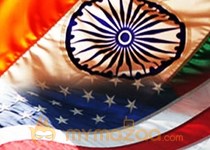Eyeing India’s $150 billion nuclear pie, a strong US business delegation embarks on a trade mission to the country next week with a promise to keep pushing for easing rules for export of high tech items to India.
“By looking to new markets abroad, American businesses remain at the point of the spear in strengthening US international relations,” said Thomas J. Donohue Donohue, president and CEO of world’s largest business federation representing the interests of more than 3 million businesses.
“In no country is this more evident than India, but our work is just beginning. India is a vital market for American companies and increasing bilateral trade and investment ties is necessary to driving job creation and innovation in both countries.”
The Chamber said a major stepping stone toward expanding trading opportunities and enhancing energy security in India came from the US-India Civil Nuclear Initiative, which resoundingly supported.
The agreement represents $150 billion in business potential for US companies and could generate as many as 250,000 high-tech American jobs, it said.
“The Chamber will remain at the forefront in the effort to streamline export control rules that are a legacy of the Cold War,” Donohue said.
“Many of the problems facing our countries can be solved by prudent application of sophisticated technology. More than ever we need to collaborate as partners in this field.
“This area has already led to an explosion of growth in US high-tech exports to India. But American businesses believe that there are more opportunities and jobs still to be created by leveraging technology.”
During his seven-day mission, Donohue will highlight opportunities for US and Indian companies to increase trade and investment, expand infrastructure, and leverage technology to create jobs in both countries.
Meeting with top business and government leaders with stops in New Delhi, Lucknow, Mumbai, and Bhopal, he will highlight India’s trillion dollar infrastructure challenge, which he hopes to convert into US business opportunities.
“Some of our best capabilities are in developing infrastructure and technologies that India critically needs,” said Donohue. “It’s time to integrate American businesses of all sizes into this supply chain.”
“To create these jobs, we’re urging the governments to not only resist protectionism, but continue to open markets, embrace domestic reforms, and provide global leadership on trade, energy, and the protection of intellectual property,” Donohue said.
He pointed to the growth in two-way trade between the countries, which has crossed $40 billion annually and is expected to grow at double-digit rates well into the next decade.
“The private sectors of both our countries have been trailblazers in bringing together the two largest free-market democracies,” he said. “Now it’s time to press our governments toward accelerating mutually beneficial commercial relations.”
Donohue will be accompanied by Ron Somers, president of the US-India Business Council.







